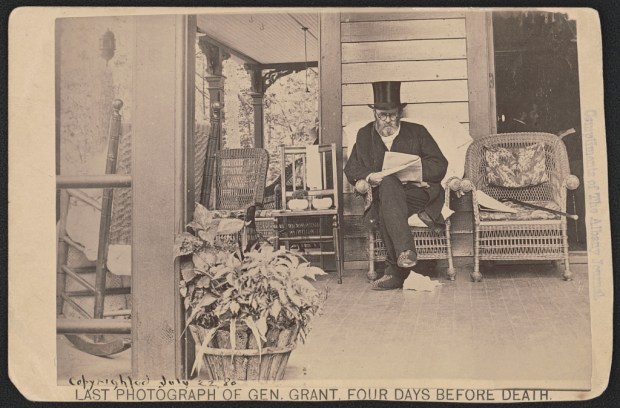Didactic dialogues in CW dictionaries, Part 4A (Gibbs 1863 ex phrases/sentences)
Let’s be clear: George Gibbs’s highly influential 1863 dictionary of Fort Vancouver-area early-creolized Chinuk Wawa doesn’t so much present us with didactic dialogues as fluent phrases…

Last photograph of General Ulysses S Grant, one of several US presidents who spoke or heard Chinook Jargon, 4 days before death
(image credit: Library of Congress)
The only sustained text that Gibbs provides us with is his closing “Lord’s Prayer” in CW.
But he really does supply us with quite a lot of other excellent sentences and such.
Be advised —
- Here I’m not going to tally up the predictable inflected forms of headwords that Gibbs shows us, such as tenas ahnkutte ‘a little while since’ and mamook bloom ‘to sweep’.
- Nor will I include here compound words, such as Boston illahie ‘the United States’, or adjective + noun (or adverb + verb) expressions such as t’kope chikamin ‘silver’.
- I’ll also leave out any simple clauses that consist of just an artificially subjectless verb, with or without some predictable “natural” object (and usually given an infinitive translation), such as mamook hahlakl la pote ‘open the door’. Any such examples that merely exemplify the already-stated senses of a word will be left out here.
All of the above are, in a sense, perfectly predictable by the rules of Chinuk Wawa grammar.
By contrast, in this mini-series I’m trying to showcase the creative use of CW, to show you how the syntax works when it’s actually spoken.
To put it another way, I want to highlight stuff whose meaning isn’t totally predictable or obvious if (like generations of would-be learners of Chinook Jargon) you only have access to a published bare-bones word list.
In today’s article, this will mostly be material that Gibbs explicitly marks as “Ex.” (an example sentence).
In the case of such a fluent and experienced speaker and interpreter as Gibbs, it’s a safe bet that he’s reporting genuine “good Jargon”.
In quoting Gibbs’s example forms, I’ll Capitalize complete utterances, but not isolated phrases.
While you’re reading these, you’re well advised to reflect on how meanings of words in “Jargon” have changed since Gibbs’s time…I’ll be adding comments to this effect.
This “Part 4” of my sporadic mini-series will show up in quite a number of installments, as I give various themes among Gibbs’s example sentences their due…
Today we start with:
ahnkutte lakit sun ‘four days ago’
(…ánqati lákit sán… literally ‘in.the.past four day’, ‘it was in the past, it was four days’)
‘Ago’ is one of those eternal sources of questions from Chinuk Wawa learners.
Some folks tend to pick up the northern-dialect word order from Shaw 1909, < tahtlum sun ahnkuttie > ‘ten days ago’. (Literally: ‘ten days in.the.past’.)
The northern dialect, in BC, also puts the number of days (etc.) first, but it says < tatilam son alta > ‘it’s 10 days now’.
You won’t find an entry for ‘ago’ in the Grand Ronde Tribes’ 2012 dictionary, so it’s from Gibbs that we have the most reliable (only?) southern-dialect suggestion of how to say this, putting the adverb ánqati first.
That word order sits fine with me, but this use of ánqati disconcerts me a little.
This word ánqati always carries the sense of ‘long ago; in the olden times’ in Chinook Jargon, so it’s odd to my ear to have it enlisted for something that occurred just the other day!
For what it’s worth, I am able to accept Gibbs’s phrasing when I picture the speaker saying (in answer to ‘Did you plant the turnips yet?’) ‘Oh yes, a loooong time ago, it’s been four days!’ 😁
But for generic ‘ago’, I’m sticking with alta ‘now’, which works fine in all dialects.

Hmm. The fact that in standard and spoken French the only way to express English “ago” (Long ago, three hours ago, centuries ago…) involves “il y a” (Typically realized as /ja/, and optionally, in more bookish styles, followed by “de cela”) BEFORE the expression of time (Il y a longtemps, Il y a trois heures, Il y a des siècles…) might be relevant in this context.
The fact that it can be used for seconds, hours, days or centuries in the past might also be relevant: if “ánqati” + expression of time was at first used to refer back to periods of time reaching back far into the past (as per the semantics of “ánqati”), French-dominant speakers may have subsequently identified this “ánqati” with their own ( “il y a” + expression of time) structure, and as a result came to use “ánqati” exactly as they did “il y a”, i.e. as a marker of past time, however close or far into the past it was.
LikeLiked by 1 person
We have tənəs-anqati ‘recently’ in the dictionary (exemplified in text 21.2, p. 440, from Wilson Bobb Sr.). Of course, there are nothing like the fine gradations of grammatical tense seen in Kiksht; but there is at least taʔanɬkʰi ‘yesterday’ (and I was going to add wəx̣t-taʔanɬkʰi ‘day before yesterday’, but don’t find that in the dictionary or in more recent notes on sources that I have compiled – so where’d it come from?). In the contemporary spoken language we have taken to enlisting taʔanɬkʰi when wanting to draw precise distinctions for past time: makwst mun taʔanɬkʰi, etc. I have it in my mind that wik-anqati for recent time is also an elder usage that I have heard, but I don’t find that in the dictionary or my notes either. I do use that, so either I can’t remember where I saw it or it is a “manufactured memory.”
LikeLiked by 1 person